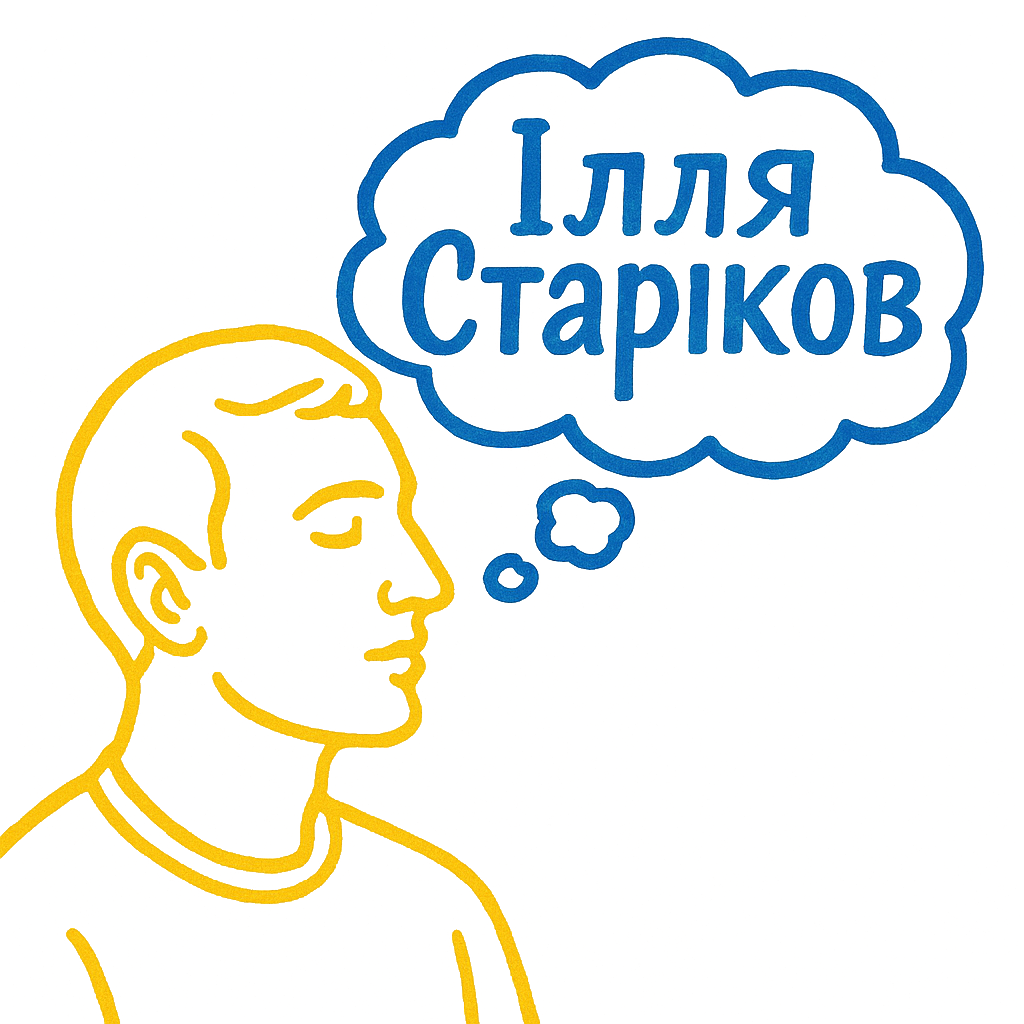How To Pronounce "Illya Starikov"
I get this question all the time: "How do you say your name?" And honestly, I always struggle with the answer. It's not just that Ukrainian sounds don't translate perfectly into English—many of the sounds in "Ілля Старіков" literally don't exist in English at all.
Usually I end up saying "close enough" to whatever people attempt, but that always feels like I'm losing something important. My name isn't Russian, it's not "basically like" anything else—it's distinctly Ukrainian, with its own unique sounds and rhythms.
So instead of fumbling through another awkward explanation, I put together this guide. Whether you're trying to get my name right or you're curious about how Ukrainian actually sounds, this should help us both out!

The authentic Ukrainian pronunciation
The name "Ілля Старіков" is pronounced [iˈlʲːɑ stɑˈrikɔw] in Ukrainian, with distinctive features that differ significantly from both English and Russian. For American English speakers, the most accurate representation is "ill-YAH stah-REE-kohw", though this requires understanding several Ukrainian-specific sounds that don't exist in English.
The name consists of two parts, each with its own stress pattern: "Ілля" (ill-YAH) with stress on the second syllable, and "Старіков" (stah-REE-kohw) with stress on "REE". This stress placement is crucial for authentic pronunciation and distinguishes it from common Americanized versions.
Understanding the Ukrainian-specific sounds
The palatalized double "л" in Ілля
The most distinctive feature of this name is the palatalized double "л" (represented as лл in Ukrainian). This creates a long, soft [lʲː] sound that's fundamentally different from English "l". To approximate this:
- Start with a regular "l" sound
- Raise the middle of your tongue toward your hard palate (as if preparing to say "y")
- Hold this position longer than a single "l" - it's a geminate (double) consonant
- Think of it as blending "l" with a subtle "y" quality throughout
This palatalized quality is what makes "Ілля" distinctly Ukrainian. The romanization "Illia" (with double "l") attempts to capture this length and intensity.
The Ukrainian "і" sound
The first letter "І" represents a pure [i] sound, like "ee" in "meet". This is not the Russian "и" sound (which is closer to "i" in "bit"). Ukrainian preserved this distinction from Old Slavic, making it a key marker of authentic Ukrainian pronunciation. The "і" should be crisp and front-positioned in your mouth.
The "я" after palatalized consonants
Following the palatalized "лл", the letter "я" doesn't represent "ya" as it would initially. Instead, it indicates that the preceding consonant is palatalized and is followed by an [ɑ] vowel. So rather than "il-li-ya", it's more like "il-[soft l with built-in y quality]-ah".
Where stress falls
Ukrainian stress patterns are unpredictable but crucial:
- Ілля: Stress falls on the second syllable - ill-YAH (not ILL-yah)
- Старіков: Stress falls on "рі" - stah-REE-kohw (not STAH-ree-kohw)
This differs from typical American stress patterns and is essential for authentic pronunciation.
Sounds particularly difficult for English speakers
1. The palatalized consonants
English doesn't distinguish between hard and soft (palatalized) consonants phonemically. The soft "л" in "Ілля" requires training your tongue to maintain a raised position while articulating the lateral sound.
2. The Ukrainian "р" (r)
Ukrainian "р" is an alveolar trill or tap [r]/[ɾ], not the American retroflex "r". Think Spanish "rr" but lighter. If you can't trill, a single tap (like the "tt" in American "butter") is closer than an American "r".
3. Maintaining vowel quality
Unlike Russian, Ukrainian doesn't reduce unstressed vowels. The "о" in "Старіков" remains a clear [ɔ] (like "aw" in "law"), not the schwa [ə] that English speakers might expect in unstressed positions.
4. The final "в"
Ukrainian "в" at the end of words can be pronounced as [w] (like English "w") or [f]. The [w] pronunciation is more authentically Ukrainian and distinguishes it from Russian [v].
Common mistakes and how to avoid them
Mistake 1: Using Russian pronunciation
Many Americans default to Russified versions because of historical Soviet influence. Key differences:
- Say "ill-YAH" not "il-YA" (Russian lacks the geminate palatalized л)
- Use clear [i] for "і", not the Russian [ɨ] sound
- Maintain full vowel quality in unstressed syllables
Mistake 2: Ignoring palatalization
English speakers often pronounce all "l" sounds the same. Practice the difference between hard "l" (as in "look") and soft "l" (tongue raised toward palate). The name has soft/palatalized "l".
Mistake 3: Wrong stress placement
Americans often stress the first syllable of foreign names. Remember: ill-YAH stah-REE-kohw, not ILL-yah STAH-ree-kohw.
Mistake 4: Over-anglicizing
Avoid turning "Ілля" into "Ilya" (which suggests Russian) or "Elijah" (the English equivalent). Preserve the Ukrainian character.
Recommended English spelling
The official Ukrainian romanization is "Illia Starikov", which best preserves Ukrainian pronunciation for English readers. This spelling:
- Uses double "l" to suggest the geminate consonant
- Avoids Russian-influenced "Ilya"
- Follows the Ukrainian National System (2010) adopted by the UN
- Helps English speakers approximate the palatalized quality
Practical pronunciation guide for Americans
"ill-YAH stah-REE-kohw"
Breaking it down:
- "ill" - Like "ill" but with softer "l" (tongue raised)
- "YAH" - Stressed syllable, rhymes with "spa"
- "stah" - Like "stop" without the "p"
- "REE" - Stressed, like "reef" without the "f"
- "kohw" - Like "cough" but with lips rounded for "w" at the end
Practice tip: Say "million" and notice how your tongue position changes for the "lli" - that's closer to the Ukrainian palatalized "л" than a regular English "l".
Remember, this name is distinctly Ukrainian, not Russian. Using the authentic pronunciation shows cultural respect and linguistic awareness. While perfect pronunciation may be challenging, making the effort to approximate these Ukrainian-specific features - especially the palatalized consonants and correct stress - will be noticed and appreciated by Ukrainian speakers.
